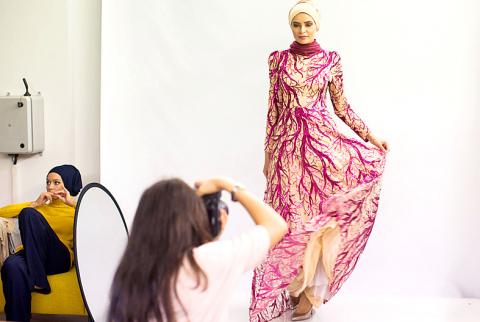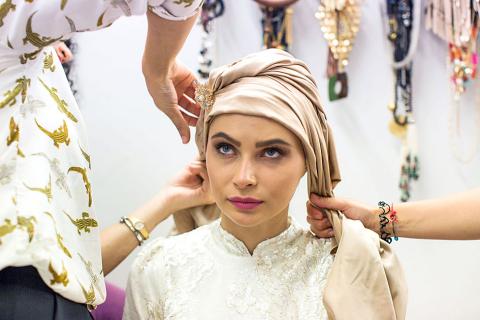The model adjusts her clothing, stares at the camera with a hint of a smile, holds her head high and the photographer starts snapping.
However, at this photoshoot on the Asian side of Istanbul, the models, impeccably made up, sport no body-hugging Western styles.
All wear headscarves and loose fitting outfits in a shoot for one of the industry’s fast growing sectors — modest, but trendy Islamic fashion.

Photo: AFP
Istanbul is positioning itself to be a hub in this nascent industry, which according to the Dubai-based Islamic Fashion and Design Council could be worth almost US$500 billion within decades.
Modanisa, a Turkish online Muslim clothing retailer, started small in 2011 and today is one of the biggest names in the market. It offers more than 30,000 products — from casual tunics to shiny evening wear to sports gear, shoes and accessories — from 300 brands and ships to 75 countries.
The firm calls itself the “first online fashion and shopping Web site for women who embrace a modest dressing style.” Modanisa chief executive Kerim Ture said that in years past there was so little choice that a religiously conservative young woman had no option but to wear the same clothes as her mother.

Photo: AFP
“If that was happening in a country [Turkey] where 99 percent of its population is Muslim, we wondered how the situation was around the world,” he added. “That’s how we’ve started our worldwide Web business.”
BURQINI BAN
Ture was surprised by this summer’s furor in strictly secular France over whether Muslim women had the right to wear the Burqini swimsuit, which covers all but the hands, feet and face.
French courts ultimately ruled that a Burqini ban by about 30 towns was “clearly illegal” and a violation of fundamental rights.
For Ture, the Burqini is not a symbol, but a choice.
“I barely understand how a country, one of whose main pillars is freedom, can oppose the Muslim swimsuit,” he said.
His firm’s catalogue offers a range of “fully closed swimsuits” starting at 40 euros (US$45), and, ironically, its Burqini sales jumped during the debate by 15 to 20 percent to France and 30 percent to the Netherlands.
In May, Istanbul hosted its first conservative fashion week at the historic Haydarpasa train station to showcase this rapidly growing market. It was organized by Franka Soeria from Indonesia, another center for Islamic clothing.
As a global consultant on modest fashion trends, Soeria decided three-and-a-half years ago to move to Istanbul — whose position straddling Europe and Asia, some say, gives it an edge.
The point of offering stylish modest clothing was not to tell people to cover up, but to show that “we are also the same as you ... we don’t want to be excluded, we don’t want to look different,” she said.
“We are showing that, hey, I am modest, I like to cover. I also like fashion. This is just my style. Just accept,” she said.
Osman Ozdemir, a Turkish designer of modest fashion, is the inhouse designer for Modanisa, but is now also working for several other firms.
“I believe Istanbul will be trend-setting on Islamic fashion,” he said. “Even high-profile and luxury brands are getting into the act.”
At the start of the year, legendary Italian fashion house Dolce & Gabbana launched its first line of hijab and abaya — some extravagantly patterned — for Muslim customers in the Middle East.
Though Turkey is a constitutionally secular state, the Islamic-rooted ruling Justice and Development Party, cofounded by Turkish President Recep Tayyip Erdogan, has advocated removing restrictions on the Muslim headscarf since it came to power in 2002.
In 2013, Turkey lifted a long-standing ban on wearing the hijab in state institutions. Last month, the government for the first time allowed policewomen to wear the headscarf under their official caps or berets.
In the conservative Fatih quarter of Istanbul, Islamic fashion stores line the streets, which are awash with billboards advertising modest styles.
“I covered my head three years ago. I didn’t want to dress up like my mother because in the past the clothes headscarf-wearing women could wear were limited,” 16-year-old shopper Seyma said. “Now I can easily find whatever I look for.”
Tourists from the Middle East are also coming to shop in Istanbul.
“I find many things: casual dresses, trousers, T-shirts and many pieces,” said Dalia, a young woman from Saudi Arabia. “I come without anything and buy from here.”
BACKLASH
Not all Turkish Muslims like the trend and see fashion as a Western tool aimed at turning Muslim women into consumer-oriented spenders.
“Islam seeks to form a modest Muslim identity, encouraging need-oriented consumption,” said Hulya Sekerci, an activist with the Free Thought and Education Rights Association, Ozgur-Der.
“On the contrary, fashion is a vicious circle encouraging excessive consumption. That’s why we are against fashion and fashion shows,” she said.
Hakan Yildiz, professor of political science at Istanbul’s Bosphorus University, said Islamic fashion stores were clearly proliferating in Turkey.
However, “we need at least a generation to see how it will evolve,” he said, adding that it would need “at least 20 years more to see if a Versace of Islam will emerge.”

GROWING OWINGS: While Luxembourg and China swapped the top three spots, the US continued to be the largest exposure for Taiwan for the 41st consecutive quarter The US remained the largest debtor nation to Taiwan’s banking sector for the 41st consecutive quarter at the end of September, after local banks’ exposure to the US market rose more than 2 percent from three months earlier, the central bank said. Exposure to the US increased to US$198.896 billion, up US$4.026 billion, or 2.07 percent, from US$194.87 billion in the previous quarter, data released by the central bank showed on Friday. Of the increase, about US$1.4 billion came from banks’ investments in securitized products and interbank loans in the US, while another US$2.6 billion stemmed from trust assets, including mutual funds,

AI TALENT: No financial details were released about the deal, in which top Groq executives, including its CEO, would join Nvidia to help advance the technology Nvidia Corp has agreed to a licensing deal with artificial intelligence (AI) start-up Groq, furthering its investments in companies connected to the AI boom and gaining the right to add a new type of technology to its products. The world’s largest publicly traded company has paid for the right to use Groq’s technology and is to integrate its chip design into future products. Some of the start-up’s executives are leaving to join Nvidia to help with that effort, the companies said. Groq would continue as an independent company with a new chief executive, it said on Wednesday in a post on its Web

Even as the US is embarked on a bitter rivalry with China over the deployment of artificial intelligence (AI), Chinese technology is quietly making inroads into the US market. Despite considerable geopolitical tensions, Chinese open-source AI models are winning over a growing number of programmers and companies in the US. These are different from the closed generative AI models that have become household names — ChatGPT-maker OpenAI or Google’s Gemini — whose inner workings are fiercely protected. In contrast, “open” models offered by many Chinese rivals, from Alibaba (阿里巴巴) to DeepSeek (深度求索), allow programmers to customize parts of the software to suit their

JOINT EFFORTS: MediaTek would partner with Denso to develop custom chips to support the car-part specialist company’s driver-assist systems in an expanding market MediaTek Inc (聯發科), the world’s largest mobile phone chip designer, yesterday said it is working closely with Japan’s Denso Corp to build a custom automotive system-on-chip (SoC) solution tailored for advanced driver-assistance systems and cockpit systems, adding another customer to its new application-specific IC (ASIC) business. This effort merges Denso’s automotive-grade safety expertise and deep vehicle integration with MediaTek’s technologies cultivated through the development of Media- Tek’s Dimensity AX, leveraging efficient, high-performance SoCs and artificial intelligence (AI) capabilities to offer a scalable, production-ready platform for next-generation driver assistance, the company said in a statement yesterday. “Through this collaboration, we are bringing two